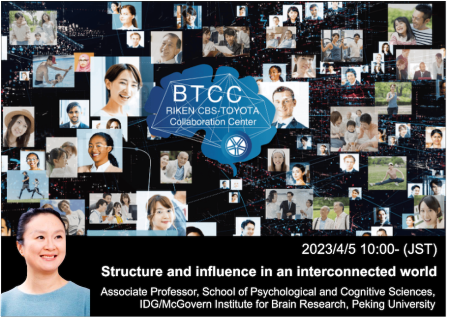- Home >
- 4/5にLusha Zhu氏が特別講演「相互接続された世界における構造と影響力(Structure and influence in an interconnected world)」を行いました。
News
4/5にLusha Zhu氏が特別講演「相互接続された世界における構造と影響力(Structure and influence in an interconnected world)」を行いました。
2023.04.27

Structure and influence in an interconnected world
Many social species are embedded on social networks, including our own. The structure of social networks shapes our decisions by constraining what information we learn and from whom. Yet the precise mechanism by which the human brain interacts with the networked environments remains unknown. A major obstacle to exploring this conundrum has been the difficulty to develop computationally-tractable and neurobiologically-plausible accounts that can characterize how the decision-making system processes information passing through social networks. In this talk, I will present some recent progress in addressing this gap. By combining ideas and methods from decision neuroscience and social network analysis, we demonstrate a neural mechanism of ‘network-dependent learning’, which filters social information according to where the sources locate on the network. This mechanism can give rise to collective maladaptation, including biased learning and misinformation propagation in an interconnected society.
相互接続された世界における構造と影響力
人類を含む多くの社会性のある生物種は、ソーシャルネットワークに埋め込まれています。ソーシャルネットワークの構造は、どの情報を誰から学ぶかという制約によって、私たちの意思決定に影響を与えます。しかし、人間の脳がネットワーク環境とどのように相互作用するのかというメカニズムは未だ不明です。この難題を探求する際の主要な障壁は、社会ネットワークを通じて情報を処理する意思決定システムを特徴づけることができる、計算上扱いやすく神経生物学的に妥当な説明手法を考案することの難しさです。この講演では、この未解決の問題に関する最近の進展をいくつか紹介します。私たちの研究では、意思決定神経科学とソーシャルネットワーク分析からのアイデアや方法を組み合わせることで、ネットワーク上の情報源の位置に応じて社会的情報をフィルタリングする「ネットワーク依存学習」という神経メカニズムを示します。このメカニズムによって、相互接続された社会において偏った学習や誤情報の伝播など、集団的な不適応を引き起こすことを説明できます。
